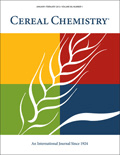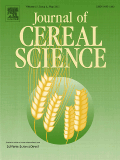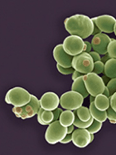
CEREAL CHEMISTRY
Scope & Guideline
Exploring Innovations in Cereal Science and Technology
Introduction
Aims and Scopes
- Cereal Grain Analysis:
Research on the physical, chemical, and nutritional properties of cereal grains, including wheat, rice, corn, and barley. - Processing Technologies:
Studies exploring the various methods of processing cereal grains, including milling, baking, and extrusion, and their effects on product quality. - Food Product Development:
Development and evaluation of new food products derived from cereal grains, focusing on sensory, nutritional, and functional attributes. - Quality Assurance and Standards:
Research aimed at establishing quality benchmarks for cereal grains and products, including safety, storage, and shelf-life. - Sustainability and Environmental Impact:
Investigations into the sustainable practices in cereal production and processing, including the environmental effects and resource management.
Trending and Emerging
- Functional Foods and Health Benefits:
There is a growing trend in researching the health benefits of cereal-based functional foods, focusing on their role in disease prevention and nutrition. - Whole Grain Products:
An increased emphasis on whole grain products and their health implications, aligning with consumer demand for healthier food options. - Biotechnology and Genetic Engineering:
Research on genetically modified cereals and biotechnological advances is gaining momentum, aimed at improving yield and resistance to pests and diseases. - Sustainable Agricultural Practices:
A significant rise in studies addressing sustainable farming practices, including organic farming and regenerative agriculture, to enhance cereal production. - Food Safety and Quality Control:
Emerging research focused on food safety protocols and quality control measures in cereal processing, reflecting growing consumer awareness and regulatory demands.
Declining or Waning
- Traditional Breeding Techniques:
Research related to conventional breeding methods for cereal crops has decreased, likely due to the increasing focus on biotechnology and genetic modification. - Historical Grain Varieties:
Studies centered on the historical aspects of grain varieties are less prevalent as current research emphasizes modern varieties and their applications. - Basic Nutritional Studies:
Basic nutritional studies of cereals are declining, possibly overshadowed by more complex investigations into functional foods and health impacts. - Regional Crop Studies:
Research focusing on regional or local varieties of cereal grains has waned, with a trend towards global studies and big data analytics. - Post-Harvest Losses:
The focus on post-harvest losses in cereals is declining as more attention is being directed towards processing and utilization efficiencies.
Similar Journals

Food and Bioprocess Technology
Innovating Sustainable Solutions for Food SafetyFood and Bioprocess Technology, an esteemed journal published by Springer, serves as a premier platform for disseminating cutting-edge research in the realms of food science, industrial manufacturing engineering, and process chemistry and technology. Established in 2008, the journal has quickly ascended to the prestigious Q1 quartile in multiple categories, highlighting its impact and relevance within the scientific community. With an impressive Scopus ranking that places it in the top tiers of its fields—such as rank #17 in Safety, Risk, Reliability, and Quality, and rank #38 in Food Science—this journal is pivotal for researchers and professionals aiming to publish innovative findings that advance food processing and bioprocess technology. Beyond its rigorous peer-review process, the journal facilitates access to high-quality, impactful research, reinforcing its significant role in shaping the future of biotechnological applications in food systems. Aimed at both scholars and practitioners, Food and Bioprocess Technology is an essential resource for those engaged in exploring sustainable practices and enhancing food quality and safety. Furthermore, by addressing essential topics in the field, it fosters collaboration and knowledge exchange among researchers dedicated to advancing the bioprocessing landscape.

FOOD SCIENCE AND BIOTECHNOLOGY
Exploring the Intersection of Science and Culinary ArtsFOOD SCIENCE AND BIOTECHNOLOGY, published by the Korean Society of Food Science & Technology (KOSFOST), stands as a prominent peer-reviewed journal dedicated to advancing knowledge in the fields of food science, biotechnology, and applied microbiology. With ISSN 1226-7708 and E-ISSN 2092-6456, this journal serves as a pivotal platform for disseminating high-impact research from South Korea and beyond, reflecting a robust Q2 ranking in multiple categories including Applied Microbiology and Biotechnology, Biotechnology, and Food Science as of 2023. The journal's influence is further emphasized by its positions in various Scopus ranks, where it showcases a commendable percentile ranking in Agricultural and Biological Sciences and Biochemistry. Although access options remain limited, the journal’s objectives revolve around the publication of innovative research, fostering interdisciplinary collaboration, and facilitating the exchange of ideas among a diverse community of researchers, professionals, and students. Whether you are involved in food technology, microbial biotechnology, or nutritional sciences, FOOD SCIENCE AND BIOTECHNOLOGY are instrumental in shaping the future of these critical fields, propelling advancements that enrich our understanding of food systems and health.

Journal of Cereal Science
Exploring the future of grains and nutrition.The Journal of Cereal Science, published by ACADEMIC PRESS LTD- ELSEVIER SCIENCE LTD, stands as a pivotal platform for the dissemination of high-quality research in the fields of biochemistry and food science, maintaining an impressive impact factor that reflects its influential position in academia. With a Q1 ranking in Food Science and a Q2 in Biochemistry as of 2023, the journal is recognized for its rigorous peer-review process and its commitment to advancing the understanding of cereal grains and their applications. Since its inception in 1983, the journal has provided comprehensive insights into areas such as grain genetics, processing technology, and nutritional aspects of cereals, catering to an audience of researchers, professionals, and students alike. The scope encompasses a diverse range of topics, ensuring a broad interdisciplinary appeal. Published through the prestigious Elsevier platform, it fosters global collaboration and knowledge sharing, thereby playing a crucial role in shaping the future of cereal science.

CEREAL RESEARCH COMMUNICATIONS
Advancing agri-food science for a sustainable future.Cereal Research Communications is a premier academic journal published by Springer Heidelberg, dedicated to advancing knowledge in the field of agri-food science with a particular focus on agronomy, crop science, genetics, and physiology. With a strong reputation reflected in its Q2 ranking in Agronomy and Crop Science, this journal serves as a vital resource for researchers, professionals, and students alike. Published in Hungary, the journal facilitates the dissemination of innovative research and practice, covering a broad spectrum from crop genetics to physiological processes, thereby fostering a multidisciplinary dialogue among scholars. The journal has maintained a consistent publication record since its inception in 1993 and will continue its commitment to academic excellence and relevance through 2024. Although it operates under a subscription model, its contributions are crucial for those engaged in improving crop productivity and sustainability. For those looking to connect with cutting-edge research and contribute to the food security dialogue, Cereal Research Communications remains an essential platform in the field.

Foods and Raw Materials
Elevating knowledge in food safety and sustainability.Foods and Raw Materials is a premier open access journal published by Kemerovo State University in the Russian Federation, dedicated to advancing knowledge in the field of Food Science. Since its foundation in 2013, the journal has established itself as a significant platform for researchers and professionals, featuring groundbreaking studies and innovative findings in both food science and veterinary disciplines. With an impressive impact factor reflected in its 2023 Scopus rankings—where it holds a Q3 categorization and is positioned in the 83rd percentile in Veterinary General, and the 75th percentile in Agricultural and Biological Sciences—the journal serves as an essential resource for academics and practitioners alike. As it continues to evolve and converge through 2024, Foods and Raw Materials aims to foster interdisciplinary collaboration and provide a comprehensive forum for the dissemination of significant research that shapes the future of food safety, sustainability, and technology.

International Food Research Journal
Exploring the Future of Food Technology and NutritionThe International Food Research Journal, published by UNIV PUTRA MALAYSIA PRESS, serves as a pivotal platform for disseminating innovative research within the field of food science. With an ISSN of 1985-4668 and an E-ISSN of 2231-7546, the journal has successfully established its presence since its inception in 2007, converging its findings through 2024. This esteemed journal holds a Q3 ranking in Food Science, illustrating its valuable contributions to the field as demonstrated by its Scopus rank of 276 out of 389, placing it in the 29th percentile among its peers in Agricultural and Biological Sciences. Although it operates under a traditional publishing model, its academic integrity and focus on high-quality research ensure that it remains a vital resource for researchers, professionals, and students eager to explore advances in food technology, nutrition, and safety. By encouraging interdisciplinary collaboration and critical dialogue, the International Food Research Journal plays an essential role in shaping the future of food science research.

Food Chemistry-X
Elevating Knowledge in Food Chemistry Excellence.Food Chemistry-X is a premier open-access journal published by Elsevier, dedicated to advancing the field of food chemistry through high-quality research and comprehensive reviews. With its ISSN of 2590-1575, the journal has gained significant attention since adopting an open-access model in 2019, allowing wide dissemination of knowledge and innovations in food science. Based in the United Kingdom, it holds prestigious Q1 rankings in both Analytical Chemistry and Food Science categories as of 2023, positioning itself as a leading platform for researchers worldwide. The journal's focus spans extensive topics within food chemistry, including food safety, nutritional analysis, and the chemical properties of food, offering insights that are crucial for addressing contemporary challenges in food production and consumption. With a Scopus rank placing it in the 65th percentile among the top journals in Food Science and the 58th percentile in Analytical Chemistry, Food Chemistry-X is an essential resource for academics, professionals, and students seeking to stay at the forefront of research and innovation in this vibrant field.

Applied Food Research
Exploring the Frontiers of Food Safety and NutritionApplied Food Research, published by Elsevier, is an esteemed journal that plays a critical role in advancing the field of Food Science. With an ISSN of 2772-5022, the journal has established itself as a premier outlet for high-quality research, achieving a commendable Q1 ranking in the 2023 Food Science category and a 63rd percentile in Scopus rankings for Agricultural and Biological Sciences. Covering a diverse range of topics from food safety to innovative processing techniques, Applied Food Research seeks to publish pioneering studies that enhance our understanding of food systems and contribute to broader discussions on sustainability and nutrition. As it converges on its fourth year of publication, researchers, professionals, and students alike are encouraged to engage with its content through various open access options, ensuring widespread dissemination of knowledge in a field that is vital to global health and well-being. Operating out of Amsterdam, Netherlands, this journal is poised to be an indispensable resource for anyone dedicated to making significant contributions in the domain of food science.

FLEISCHWIRTSCHAFT
Driving knowledge in the evolving meat sector.FLEISCHWIRTSCHAFT is a prominent academic journal published by Deutscher Fachverlag GmbH, dedicated to the field of food science, with a special focus on the meat industry. Established in Germany and boasting an ISSN of 0015-363X, this journal provides invaluable insights into meat production, processing, and quality assurance. Although it operates on a standard subscription basis, its contributions are essential for researchers, professionals, and students who seek to advance their knowledge in food safety, technology, and industry trends. With its historical convergence years spanning from 1973 to 2022, FLEISCHWIRTSCHAFT presents a rich repository of research that caters to current and evolving challenges within the agricultural and biological sciences. Classified in the Q4 quartile for Food Science, this journal plays a critical role in disseminating important findings and fostering scholarly dialogue within a niche but crucial sector of food science.

Annual Review of Food Science and Technology
Empowering Scholars in the Evolving World of Food ScienceThe Annual Review of Food Science and Technology, published by ANNUAL REVIEWS, is an esteemed journal dedicated to advancing the knowledge within the field of food science. With an impressive Q1 ranking in the Food Science category, and ranking as #6 out of 389 in the Scopus Agricultural and Biological Sciences category, the journal serves as a vital resource for researchers, professionals, and students. This publication encapsulates comprehensive reviews and cutting-edge research, helping to bridge the gap between research and practical application. Though it does not offer Open Access, it provides valuable insights into various aspects of food science from 2010 to 2024, ensuring that its readership stays at the forefront of emerging trends and innovations. The journal's focus on high-quality, peer-reviewed articles makes it a critical platform for scholars looking to deepen their understanding and contribute to this rapidly evolving field.